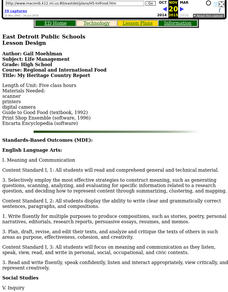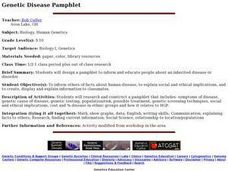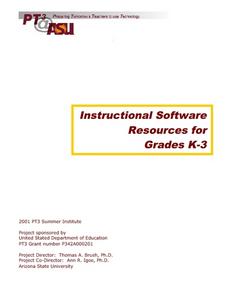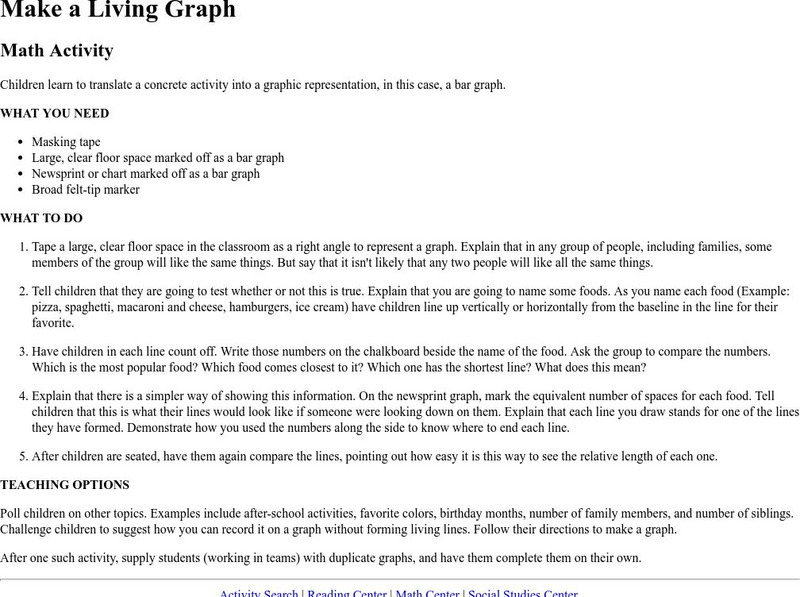Curated OER
Determination of the percentage of Acetic Acid in Vinegar
Young scholars determine the concentration of acetic acid when the concentration of the base with which is titrated is known. They investigate how to weigh a sample using the balance, measure volumes using graduated cylinder, explore...
Curated OER
Mind Your Business
Students explore how to identify the range, median, and mode in a list of numbers by using concrete materials.
Curated OER
My Heritage Country Report
Students list five food dishes that are part of their family's heritage. Each student then does research of a country and a recipe (possibly a family recipe). With the help of members of his/her kitchen group, the student prepares the dish.
Curated OER
Geometry Scavenger Hunt
Learners use the digital camera, identify geometric shapes (in nature as well as man-made), and gain a better understanding of geometric vocabulary. They search for and recognize geometric shapes in unusual settings
Curated OER
Genetic Disease Pamphlet
Students design a pamphlet to inform and educate people about an inherited disease or disorder.
Curated OER
Flow Rates of Faucets and Rivers
Students work together to discover the flow rates of faucets and rivers. They relate their results to engineering and applied science concepts. They make predictions on the flow rate of a nearby river in their local community.
Curated OER
Searching the Attic
Students investigate an attic or basement to "discover" family artifacts. They develop a grid map using string, create a naming system for the grid, and analyze items of interest.
Curated OER
Instructional Software Resources for Grades K-3
Learners become familiar with teh selection, evaluation, and use of instructional software for 4-8 classroom. They download software demos from the web and discuss critiquing software. Students browse software evaluations on web sites.
Shodor Education Foundation
Shodor Interactivate: Comparison of Univariate and Bivariate Data
Young scholars learn about the difference between univariate and bivariate data and understand how to choose the best graph to display the data.
Better Lesson
Better Lesson: Graph Party
First graders will be involved in creating three different types of graphs and then be asked to answer questions about each representations data set.
Better Lesson
Better Lesson: Line Graph Activity
Data collected is represented in tables and the students will need to choose what they want to represent in their line graph.
Other
Bscs: Frog Symphony
For this self-directed lesson, students use maps and graphs of data to investigate the habitats and time of year and day to hear a full chorus of frogs. A handout with everything the student needs to complete this lesson is available as...
Education Place
Houghton Mifflin: Eduplace: Make a Living Bar Graph
Student use simple data to line up in a living bar graph activity when they respond to simple questions in this lesson plan. They physically and visually represent the data. CCSS.Math.Content.3.MD.B.3 Draw a scaled picture graph and a...
Better Lesson
Better Lesson: Misleading Leading Graphs
Through the use of real life data, the students will be looking at a variety of graphs to decide if they are displaying misguided information.
Other
Bscs: Restoring Oyster Reefs
In this self-directed lesson plan, students use data from the Chesapeake Bay estuary to determine suitable sites for oyster reef restoration. A handout with everything the student needs to complete this lesson plan is available as a PDF...
PBS
Pbs Mathline: Button, Button Lesson Plan [Pdf]
An integrated math and language arts activity focusing on statistics. Young scholars explore the concepts of estimation, data collection, data analysis, classification, graphing, and counting through the reading of the Button Box by...











